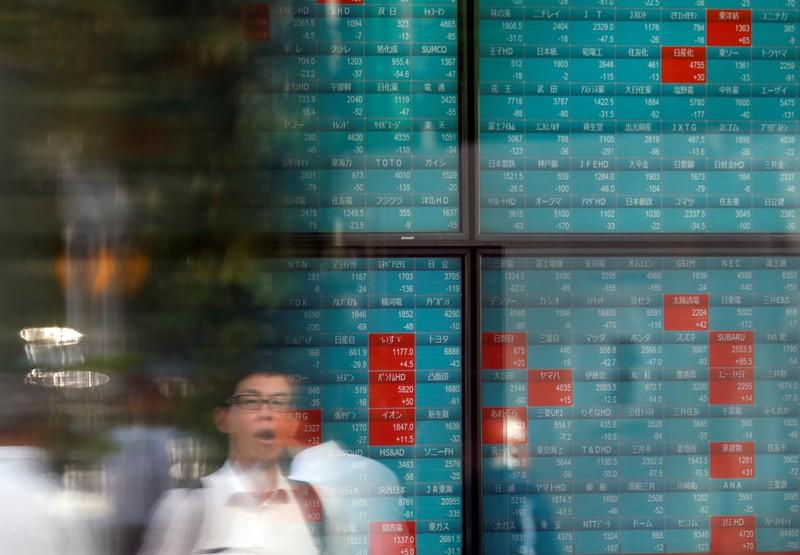By Swati Pandey
SYDNEY (Reuters) - Asian shares took off on Wednesday and sterling held near six-month highs as Britain and the EU made headway on a Brexit deal ahead of a leaders’ summit though it remained unclear if London could avoid postponing its scheduled departure on Oct. 31.
Officials and diplomats involved in negotiations over the acrimonious divorce between the world’s fifth-largest economy and its biggest trading bloc said that differences over the terms of the split had narrowed significantly.
The news lit a fire under European and U.S. equities, which jumped about 1% on Tuesday. The British pound rocketed to $1.28, a level not seen since May 21. It gave back some of those gains on Wednesday to be last at $1.2759.
The pound has strengthened nearly 5% over the past week as investors rushed to reprice the prospect of a last-minute Brexit deal before the end-October deadline.
The positive sentiment extended on Wednesday with MSCI’s broadest index of Asia-Pacific shares outside Japan <.MIAPJ0000PUS> lifting 0.3%.
Japan’s Nikkei <.N225> jumped 1.7% while Australian shares <.AXJO> added 0.9% and South Korea’s KOSPI index <.KS11> climbed 0.7%.
Stronger-than-expected earnings from major U.S. banks JPMorgan , Citigroup and Wells Fargo further boosted sentiment even as the International Monetary Fund downgraded its 2019 global growth forecast for a fifth time.
Impact Shorts
More Shorts“Equities rallied everywhere supported by another set of Brexit headlines and as earnings season started in the United States,” JPMorgan analysts wrote in a client note.
“Officials cautioned that talks haven’t finished yet and there could yet be problems in hitting the deadline of midnight Tuesday,” they added.
The EU’s chief Brexit negotiator Michael Barnier had been demanding a legal text of any agreement by midnight U.K. time. However, the talks were still going on between UK Brexit negotiator David Frost and the EU’s executive European Commission past midnight in Brussels.
The EU will determine whether a deal is fit to be put to Thursday’s leaders’ summit for consideration.
“Watching the UK news channels last night, the arithmetic for achieving said approval is challenging to say the least,” analysts at National Australia Bank wrote in a note.
Elsewhere, news on the U.S.-China trade front has been less encouraging.
Bloomberg reported, citing sources, that China will struggle to buy $50 billion of U.S. farm goods annually unless it removes retaliatory tariffs on American products, which would require reciprocal action by U.S. President Donald Trump.
“It is also pretty apparent that President Xi Jinping is not going to put his signature to a Phase I deal next month unless or until the U.S. rescinds the threat of imposing additional tariffs on China on December 15,” NAB analysts said.
In currencies, the Japanese yen was at the lowest in 2-1/2 months against the greenback as investors flocked to riskier assets. It was last at 109.82 per dollar.
The dollar itself was under pressure against a basket of six major currencies with its index <.DXY> hovering near three-week lows at 98.288. The euro was flat at $1.1369.
In commodities, Brent crude added 21 cents to $58.94 a barrel, while U.S. crude rose 20 cents to $53.01 after falling the previous session over fears the unrelenting U.S.-China trade war would keep squeezing the global economy.
Spot gold was barely changed at $1,481.48 an ounce.
(Editing by Sam Holmes)
This story has not been edited by Firstpost staff and is generated by auto-feed.


)

)
)
)
)
)
)
)
)



